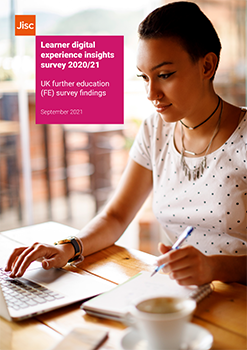Learner digital experience insights survey 2020/21: further education findings
This year, 23,741 learners from 39 UK colleges and sixth form colleges took part in our student digital experience insights survey.

This year, 23,741 learners from 39 UK colleges and sixth form colleges took part in our student digital experience insights survey. The survey was conducted between October 2020 and April 2021.
Digital transformation gathers pace
This year’s report is published at a time like no other. We have an opportunity to reimagine the next normal for further education (FE) and skills providers in terms of how best to work and study now and in the years ahead. The sector is rapidly learning from adapting to the pandemic, both organisationally and individually.
Jisc has been running digital experience insights surveys since 2016, and this is perhaps the most pivotal of them all. The coronavirus pandemic has emphasised the need for digital transformation and reinvigorated the drive for colleges to make effective use of digital.
The data gathered from our 2020/21 student digital experience insights survey for FE highlights areas for concern as well as examples of good practice to build on for the future. Note that this year, we focused on online learning. We asked learners to respond to the questions based on their experiences in the two weeks immediately prior to taking the survey.
Key findings
- More than half (66%) of learners surveyed in this report rated the overall quality of online and digital learning highly, rating it as ‘good’ through to ‘best imaginable’ although not all learners felt they experienced the best that digital learning could offer in terms of interactive, engaging and collaborative learning
- Although there were many positive aspects to studying online, some learners faced significant barriers to participation. 49% of learners reported problems with wifi connectivity and others cited mobile data costs (21%), access to suitable computers/devices (14%) and a lack of a suitable, safe place to study (12%) as problems that inhibited or prevented their ability to learn online
- While welcoming the range of resources now available to learners online, lower numbers than is desirable felt that their learning environments were easy to navigate (53%), reliable (46%) or well-designed (46%)
- Colleges provided a lot of support for learners but our findings suggest that some of this was less visible or less accessible when studying online. Very few turned to IT/e-learning staff (8%) or library staff (3%) – two natural sources of on campus support
- 49% of learners agreed that they were given the chance to be involved in decisions about online learning and only 14% disagreed. This is a substantially more positive response than given to similarly phrased questions in previous years and is something that colleges can build on in the future.
The full report gives a detailed analysis of our findings and guidance on how colleges can address the issues raised.
About the authors

I work in the business intelligence unit at Jisc, primarily on the digital experience insights surveys for students, academic staff and professional services staff. The focus is on supporting members across further and higher education to enrich their student experiences by providing powerful data to inform strategic planning and investment.